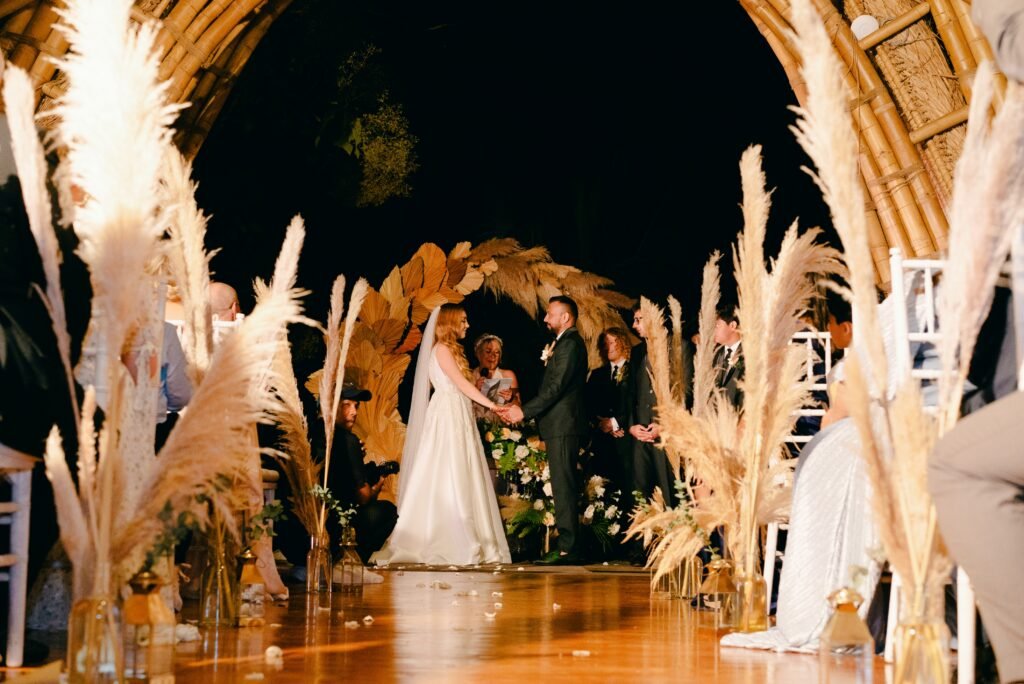
When it comes to planning a wedding, one of the key considerations is understanding the financial responsibilities involved. In Indonesia, a country rich in diverse traditions and customs, the question often arises: Who pays for the wedding in Indonesia?
In this comprehensive guide, we’ll explore both traditional practices and modern approaches to shed light on this important aspect of wedding planning.
Table of Contents
- Understanding Traditional Practices
- Modern Approaches to Wedding Expenses
- Factors Influencing Financial Responsibilities
- Navigating Cultural Expectations
- Destination Weddings in Indonesia
- Conclusion: Capture the Moments with Photolagi
Who Pays for the Wedding in Indonesia – Understanding Traditional Practices

In traditional Indonesian weddings, the financial burden is often shared among various parties, reflecting the close-knit nature of families and communities.
In Indonesia, the financial responsibilities for a wedding are typically shared among various parties based on traditional customs and modern practices. The allocation of expenses can vary depending on cultural norms, family agreements, and personal preferences.
Traditional Practices:
Bride’s Family: Historically, the bride’s family bears a significant portion of the wedding expenses. This tradition stems from the idea of the bride’s family showcasing their generosity and ability to host a lavish celebration.
Groom’s Family: The groom’s family may contribute by covering specific costs such as the engagement ring, wedding attire, or ceremonial gifts. They also play a role in providing financial support for certain aspects of the wedding.
Shared Expenses: In some cases, both families come together to share the financial burden of the wedding. This collaborative approach reflects unity and mutual respect between the two families.
Modern Approaches:
Equal Contribution: With changing societal norms and economic factors, modern couples often opt for a more egalitarian approach where both families and the couple contribute equally to the wedding expenses. This approach promotes financial independence and shared responsibility.
Couple’s Contribution: In contemporary settings, many couples choose to finance their own wedding entirely or make a substantial contribution to the overall costs. This trend emphasizes self-reliance and the couple’s autonomy in planning their special day.
Flexible Arrangements: There is a growing trend towards flexibility in financial arrangements, allowing families and couples to tailor the contribution based on individual circumstances and preferences. This approach accommodates diverse financial situations and fosters open communication among all parties involved.
Understanding these traditional practices provides insight into the cultural nuances that influence financial contributions.
Marriage is one of the special moments in a person’s journey of life. However, there are many things to consider before someone gets married, one of which is the cost.
According to research by iPrice, the average cost of a wedding in Indonesia can reach Rp191.65 million in 2021.
This value is estimated based on 250 attending guests.
- In detail, venue and catering constitute the largest expenses for a wedding, totaling Rp80.9 million.
- The average cost for wedding decorations is Rp17.95 million.
- Furthermore, the average expenses required for wedding planners and bridal gowns are Rp13.75 million and Rp11.10 million respectively.
- There is also a cost for wedding photography amounting to Rp13.25 million.
- The average cost for prewedding photography is around Rp7.65 million.
- The expenses for wedding organizers stand at Rp7.31 million.
- Moreover, the average expenses for entertainment and makeup respectively amount to Rp7.25 million and Rp5.88 million.
- As for wedding suits, the required cost is Rp6.99 million.
- The expenditure for purchasing wedding souvenirs is Rp3.75 million.
- Meanwhile, the cost required for online arrangements, such as live streaming services and digital invitations, is Rp2.5 million.
Modern Approaches to Wedding Expenses

As times evolve, so do the customs surrounding wedding finances. In modern Indonesia, there’s a greater inclination towards a more egalitarian approach.
Couples often take on a more active role in financing their own wedding, with contributions from both families.
This shift reflects changing societal norms and a move towards greater independence for the marrying couple.
Indonesia boasts a rich diversity of ethnicities and cultures, leading to varied customs and practices, particularly evident in wedding celebrations.
The financing of weddings in Indonesia depends greatly on the respective ethnicities and cultures involved. For instance, among the Bugis and Makassar people, the groom typically bears the expenses, including the renowned high-cost “uang panai” given to the bride’s family as a form of dowry and for the wedding reception.
Similarly, in Javanese culture, particularly in regions like Central Java, it is customary for the groom to provide “uang tukon” or engagement money, which serves as both the dowry and reception costs.
While traditions may vary, the common theme across many cultures is the financial responsibility of the groom, although there are exceptions, such as in certain Javanese regions like Indramayu, where the bride may contribute by purchasing household items.
Notably, in Minangkabau culture, it is the bride who initiates the proposal and subsequently hosts and finances the wedding ceremony.
Beyond ethnic ties, there is a growing trend, particularly among millennials in urban areas like Jakarta, to opt for a collaborative financing approach, often termed “patungan,” where both families share the wedding expenses based on mutual agreement.
This approach is favored for its flexibility and the desire not to burden either party, especially if both individuals are financially independent.
In conclusion, regardless of who finances the wedding, the key factors are mutual agreement and sincerity, as to avoid potential conflicts over excessive expenses or unvoiced concerns.
It is essential to prioritize open communication and mutual respect to ensure a harmonious beginning to married life, irrespective of cultural or financial differences.
Factors Influencing Financial Responsibilities

Factors Influencing Wedding Expenses in Indonesia
Cultural Background:
Customs and Traditions: In Indonesia, cultural traditions play a significant role in determining who pays for the wedding. For example, in Javanese culture, the bride’s family traditionally bears the majority of the wedding expenses.
Ethnic Diversity: Indonesia’s diverse ethnic groups, such as Javanese, Sundanese, Balinese, and others, have unique customs regarding wedding finances, influencing who takes on the financial responsibilities.
Socioeconomic Status:
Financial Capability: The socioeconomic status of the families involved can heavily influence who pays for the wedding. Families with higher financial capabilities may be more inclined to cover a larger portion of the expenses.
Personal Preferences:
Modern Outlook: With changing societal norms and modern influences, couples in Indonesia may have personal preferences that impact how they distribute the wedding expenses. Some couples may choose to fund the wedding independently or share the costs equally.
Family Dynamics:
Family Expectations: Expectations from both the bride’s and groom’s families regarding wedding traditions and financial responsibilities can shape who pays for what in an Indonesian wedding.
Generational Differences: Variations in generational attitudes towards wedding expenses can also influence the financial arrangements, with younger couples often having different perspectives on sharing costs.
Regional Variances:
Geographical Influence: Different regions in Indonesia may have varying customs and practices related to wedding finances. For example, weddings in Bali may follow different financial norms compared to those in Java or Sumatra.
Communication and Agreement:
Open Discussions: Effective communication between the couple and their families is crucial to align expectations and reach agreements on who will cover which expenses.
Negotiation: Negotiating and finding a balance that considers cultural traditions, financial capabilities, and personal preferences can help determine the distribution of wedding costs.
Conclusion:
Understanding the interplay of cultural background, financial capabilities, personal preferences, and family dynamics is essential in determining who pays for a wedding in Indonesia. Open communication and mutual agreement among all parties involved are key to ensuring a harmonious and financially feasible wedding celebration.
Navigating Cultural Expectations

Understanding Cultural Expectations at Indonesian Weddings
Navigating cultural expectations at Indonesian weddings involves respecting traditional customs, communicating effectively, and finding a balance between honoring traditions and personal preferences.
Respecting Traditions
Understanding Customs: Familiarize yourself with the customs and traditions specific to the region or ethnic group hosting the wedding. Each region in Indonesia may have unique wedding customs.
Respectful Attire: Dress appropriately according to cultural norms and traditions. Traditional attire may be expected, such as kebaya for women and batik for men.
Participation: Engage in traditional ceremonies and practices with sincerity and respect to show your appreciation for the culture.
Effective Communication
Open Dialogue: Communicate openly with the couple and their families to understand their expectations and preferences regarding cultural traditions and wedding arrangements.
Clear Expectations: Clearly express your own preferences and boundaries while being receptive to the customs of the host culture.
Compromise: Seek compromises that honor cultural expectations while also accommodating personal preferences and values.
Proper Etiquette
Respect Elders: Show deference to elders and follow traditional etiquette practices, such as addressing them with proper titles and gestures.
Gift Giving: Follow customary gift-giving practices, such as presenting gifts to the couple or their families as a token of goodwill and respect.
Graceful Participation: Engage in wedding activities and ceremonies with grace and enthusiasm, demonstrating your appreciation for the cultural significance of the event.
Conclusion
Navigating cultural expectations at Indonesian weddings requires a blend of respect for traditions, effective communication, willingness to compromise, and adherence to proper etiquette. By approaching the event with sensitivity and openness, guests can contribute to a harmonious and culturally enriching celebration.
Destination Weddings in Indonesia

Destination weddings in Indonesia, particularly in popular locations like Bali, add an extra layer of considerations.
Check our Guide for Destination Weddings location at Indonesia
Couples and their families need to account for travel expenses, accommodation, and logistical arrangements. Navigating these aspects requires careful planning and coordination.
Capture the Moments with Photolagi
In the midst of navigating the intricacies of wedding planning in Indonesia, one crucial aspect often overlooked is capturing the magical moments. At Photolagi, we specialize in turning your wedding day into a visual masterpiece.
Our experienced team understands the cultural richness of Indonesian weddings, and we know how to immortalize those special moments.
As you plan your wedding in Indonesia, particularly in the picturesque landscapes of Bali – Jakarta – Yogyakarta – Surabaya, consider securing Photolagi’s services. Our expertise lies in capturing the essence of your unique love story, ensuring that every emotion and detail is preserved for a lifetime.
Contact us now to book our services and let us be the storytellers of your beautiful wedding in Indonesia.
Your journey begins with saying “I do,” and Photolagi is here to capture every moment along the way.


